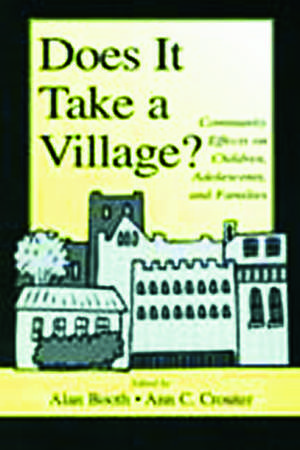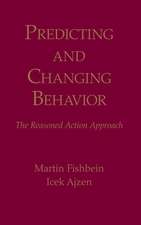Does It Take A Village?: Community Effects on Children, Adolescents, and Families: Penn State University Family Issues Symposia Series
Editat de Alan Booth, Ann C. Crouteren Limba Engleză Paperback – 2001
As a society we have heavy investments both in research and in programs based on the idea that communities affect families and children, yet important questions have arisen about the validity of the link between communities, children, and families. This book answers the question of whether--and how--it takes a village to raise a child and what we can do to help communities achieve this essential task more effectively.
Preț: 446.53 lei
Nou
Puncte Express: 670
Preț estimativ în valută:
85.44€ • 89.21$ • 70.72£
85.44€ • 89.21$ • 70.72£
Carte tipărită la comandă
Livrare economică 04-18 aprilie
Preluare comenzi: 021 569.72.76
Specificații
ISBN-13: 9780805832433
ISBN-10: 0805832432
Pagini: 278
Dimensiuni: 152 x 229 x 15 mm
Greutate: 0.39 kg
Ediția:New.
Editura: Taylor & Francis
Colecția Psychology Press
Seria Penn State University Family Issues Symposia Series
Locul publicării:Oxford, United Kingdom
ISBN-10: 0805832432
Pagini: 278
Dimensiuni: 152 x 229 x 15 mm
Greutate: 0.39 kg
Ediția:New.
Editura: Taylor & Francis
Colecția Psychology Press
Seria Penn State University Family Issues Symposia Series
Locul publicării:Oxford, United Kingdom
Public țintă
ProfessionalCuprins
Contents: Preface. Part I: How Do Communities Undergird or Undermine Human Development? What Are the Relevant Contexts and What Mechanisms Are at Work? R.J. Sampson, How Do Communities Undergird or Undermine Human Development? Relevant Contexts and Social Mechanisms B.A. Lee, Taking Neighborhoods Seriously. D. Massey, The Prodigal Paradigm Returns: Ecology Comes Back to Sociology. Part II: How Do Neighborhoods Enhance or Interfere With Families' Abilities to Raise Children? M.B. Spencer, Resiliency and Fragility Factors Associated With the Contextual Experiences of Low-Resource Urban African-American Male Youth and Families. J.E. Korbin, Context and Meaning in Neighborhood Studies of Children and Families. S.J. South, Issues in the Analysis of Neighborhoods, Families, and Children. M.L. Sullivan, Hyperghettos and Hypermasculinity: The Phenomenology of Exclusion. Part III: How Do Neighborhoods Affect the Development of Adolescent Problem Behavior? G.J. Duncan, S.W. Raudenbush, Neighborhoods and Adolescent Development: How Can We Determine the Links? J.O.G. Billy, Better Ways to Do Contextual Analysis: Lessons From Duncan and Raudenbush. L.M. Burton, One Step Forward and Two Steps Back: Neighborhoods, Adolescent Development, and Unmeasured Variables. S. Small, A. Supple, Communities as Systems: Is a Community More Than the Sum of Its Parts? Part IV: What Policies Can Strengthen Neighborhoods as Contexts for Child and Adolescent Well-Being? J.P. Connell, A.C. Kubisch, Community Approaches to Improving Outcomes for Urban Children, Youth, and Families: Current Trends and Future Directions. R.B. Taylor, On Mount and Fayette: Implications for Comprehensive Youth Development Approaches. M. Greenberg, Developmental and Ecological Considerations in Implementing Community Action Strategies for Children and Youth. D.A. Blyth, Community Approaches to Improving Outcomes for Urban Children, Youth, and Families. F. Avenilla, S. Singley, Neighborhood Effects on Child and Adolescent Development: Assessing Today's Knowledge for Tomorrow's Village.
Descriere
In this volume, experts from several social science disciplines explore the condition under which communities affect children's development and family functioning.
















